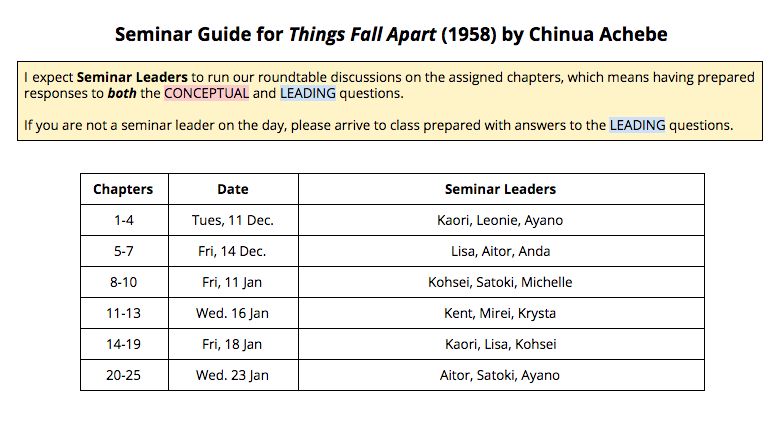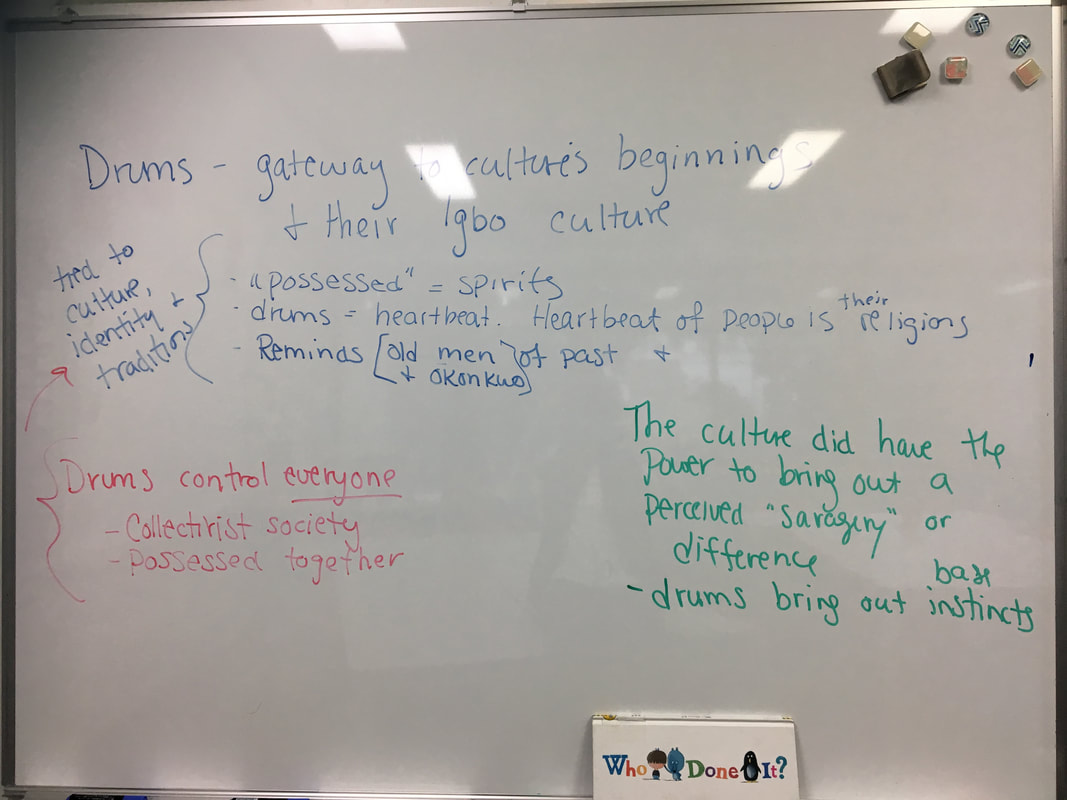|
"The last four or five hundred years of European contact with Africa produced a body of literature that presented Africa in a very bad light and Africans in very lurid terms. The reason for this had to do with the need to justify the slave trade and slavery. … This continued until the Africans themselves, in the middle of the twentieth century, took into their own hands the telling of their story."
(Chinua Achebe, "An African Voice", The Atlantic) |
Postcolonialism: 'Writing back' to the canon; 'Writing back' to the imperial centre.
Nativism: Avoiding glorification - "Kwame Anthony Appiah (1991) (among others) has also criticised the tendency to eulogise the pre-colonial past or romanticise native culture. Such 'nativism', he suggests, is espoused by both certain intellectuals within postcolonial societies and some First World academics" (Loomba 38).
Achebe on writing back to Joseph Conrad's Heart of Darkness (1899)
- "The process of disengagement from the whole colonial syndrome" (Loomba 38).
- [Postcolonial literature] emerged in their present form out of the experience of colonization and asserted themselves by foregrounding the tension with the imperial power, and by emphasizing their differences from the assumptions of the imperial centre. It is this which makes them distinctly post-colonial" (Ashcrot, Griffiths and Tiffin 2).
Nativism: Avoiding glorification - "Kwame Anthony Appiah (1991) (among others) has also criticised the tendency to eulogise the pre-colonial past or romanticise native culture. Such 'nativism', he suggests, is espoused by both certain intellectuals within postcolonial societies and some First World academics" (Loomba 38).
Achebe on writing back to Joseph Conrad's Heart of Darkness (1899)
|
|
|
|
Task: Read the three articles written by Achebe and consider the questions below:
- To what extent has he and other Nigerians been impacted by Colonialism?
- How is Achebe trying to reclaim elements of his heritage and culture?
- What is Achebe's attitude towards English language? Why does he choose to write in English when others do not?
|
| ||||||||||||
| the_politics_of_language_-_achebe.pdf | |
| File Size: | 4007 kb |
| File Type: | |
Discussing the end first: Chapter 25
- Okonkwo is no stranger to the traditions and customs of Umuofia. He would know that it is "an abomination for a man to take his own life. It is an offense against the Earth, and a man who commits it will not be buried by his clansmen. His body is evi, and only strangers may touch it" (207), and yet he still chooses suicide. What is the impact of Okonkwo's suicide? What is Achebe's point here?
- What is the impact of the change in tone and perspective at the end of the novel? To what extent is this Achebe’s direct postcolonial critique?
Access the full Seminar Guide with questions. You are expected to be prepared for class with notes: observations, insight, questions
Essential Questions: Chapters 1-4
- How is masculinity defined and represented through the characters?
- How does Achebe present Ibo traditions, culture, and society?
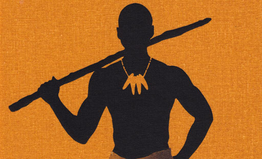
Seminar Discussion Chapters 1-4- Lesson 1:
Leading Questions: Everyone is to prepare responses to these questions. Bring your notes, observations, insights, and questions to class.
- Do a close reading of the descriptions of Okonkwo and Unoka in chapter one. How do these two characters differ? What kind of language is used to describe each of them? Why might Achebe have created a flawed character as our protagonist?
- Who are the Igbo people? Where do they live? What is their life like? How do they make decisions about war, consequences, and marriage?
- What do they believe? What have we learned about their religious system?
- What other cultural concepts in the book are unique to Igbo people? Why do you think Achebe includes these? What do they tell us about Igbo people and their beliefs in the novel? Consider the attitude towards the land, the use of proverbs, festivals etc.
- What are “kola nuts” and how are they used in the novel? What do they represent or symbolize?
- What elements of Igbo culture and society are similar to your own? What elements differ?
Chapters 1-4 Lesson 2: Order, Society, Perspective
- How does Achebe contradict the stereotype of the African savage?
- Task: Identify moments in chapters 1-4 that answer the above question. Isolate the example and:
- Summarize: What is happening in this scene?
- Examine: What words, phrases, sentences stand out? What do they reveal? (any lit features within?)
- Analyse/Interpret: What is Achebe's point? What does he emphasize to the reader and for what purpose?
- Task: Identify moments in chapters 1-4 that answer the above question. Isolate the example and:
What is the significance of this passage? How could we interpret it beyond the scope of this moment in the novel? What might Achebe be saying through this passage?
"That year the harvest was sad, like a funeral, and many farmers wept as they dug up the miserable and rotting yams. One man tied his cloth to a tree branch and hanged himself.
Okonkwo remembered that tragic year with a cold shiver throughout the rest of his life. It always surprised him when he thought of it later that he did not sink under the load of despair. He knew that he was a fierce fighter, but that year had been enough to break the heart of a lion.
'Since I survived that year,' he always said, 'I shall survive anything.' He put it down to his inflexible will.
His father, Unoka, who was then an ailing man, had said to him during that terrible harvest month: 'Do not despair. I know you will not despair. You have a manly and a proud heart. A proud heart can survive a general failure because such a failure does not prick its pride. It is more difficult and more bitter when a man fails alone.'
Unoka was like that i his last days. His love of talk had grown with age and sickness. It tried Okonkwo's patience beyond words"
(End of chapter 3: 24-25).
Overarching question to consider:
- What does Okonkwo symbolize?
Essential Questions: Chapters 5-7
CONCEPTUAL: Explore the power of fear in the novel. How are the characters driven and shaped by fear? Does fear play a part in the outcome of these chapters? Why is fear a key component of the Ibo system of belief (or is it)? Why is fear such a large part of Okonkwo’s character? How does it affect him? Is there any element of fear in our lives that we also see in Ibo culture?
Seminar Discussion Chapters 5-7- Lesson 1:
Leading Questions: Everyone is to prepare responses to these questions. Bring your notes, observations, insights, and questions to class.
- What role does fear play in the novel (for the characters and the society as a whole)?
CONCEPTUAL: Explore the power of fear in the novel. How are the characters driven and shaped by fear? Does fear play a part in the outcome of these chapters? Why is fear a key component of the Ibo system of belief (or is it)? Why is fear such a large part of Okonkwo’s character? How does it affect him? Is there any element of fear in our lives that we also see in Ibo culture?
Seminar Discussion Chapters 5-7- Lesson 1:
Leading Questions: Everyone is to prepare responses to these questions. Bring your notes, observations, insights, and questions to class.
- What does the term “protagonist” mean? What happens when our protagonist is kind of antagonistic? Is Okonkwo a sympathetic character? How can we relate to him? Does he remind you of anyone you know?
- What is the significance of the drums?
- Discuss specific characters/pairs of characters and what they mean to the rest of the text. (Enzima v Nwoye; Ikemefuna v Nwoye; Okonkwo v Nwoye;
- What is the significance of the child Ikemefuna to the novel? Why does Okonkwo kill him? What can be learned from this episode? How does Ikemefuna’s death impact Nwoye, and what could the final paragraph in chapter 7 reveal?
Chapters 5-7 Lesson 2: Aural imagery and the drums
Recap: With your group, fill out a quick chart to represent what we have discussed so far. Retrieve memories from before break!
Recap: With your group, fill out a quick chart to represent what we have discussed so far. Retrieve memories from before break!
|
Key Moments So Far
|
Important Characters and Traits
|
Themes & Connections to Colonialism/Post-colonialism
|
Essential Question: How and why does Achebe use sound in the novel?
Passage 1:
"Just then the distant beating of the drums began to reach them. It came from the direction of the ilo, which was as old as the ground. Every village had its own ilo which was as old as the village itself and where all the great ceremonies and dances took place. The drums beat the unmistakable wrestling dance-- quick, light and gay, and it came floating on the wind.
Okonkwo cleared his throat and moved his feet to the beat of the drums. It filled him with fire as it had always done from his youth. He trembled with the desire to conquer and subdue. It was like the desire for woman" (ch5, p.42).
Passage 2:
"The drums were still beating, persistent and unchanging. Their sound was no longer a separate thing from the living village. It was like the pulsation of its heart. It throbbed in the air, in the sunshine, and even in the trees, and filled the village with excitement" (ch5, p.44).
Passage 3: Read chapter 6 (paragraph 3-second to last paragraph).
Task: Read all three passages and complete the tasks and questions below:
Passage 1:
"Just then the distant beating of the drums began to reach them. It came from the direction of the ilo, which was as old as the ground. Every village had its own ilo which was as old as the village itself and where all the great ceremonies and dances took place. The drums beat the unmistakable wrestling dance-- quick, light and gay, and it came floating on the wind.
Okonkwo cleared his throat and moved his feet to the beat of the drums. It filled him with fire as it had always done from his youth. He trembled with the desire to conquer and subdue. It was like the desire for woman" (ch5, p.42).
Passage 2:
"The drums were still beating, persistent and unchanging. Their sound was no longer a separate thing from the living village. It was like the pulsation of its heart. It throbbed in the air, in the sunshine, and even in the trees, and filled the village with excitement" (ch5, p.44).
Passage 3: Read chapter 6 (paragraph 3-second to last paragraph).
Task: Read all three passages and complete the tasks and questions below:
- Identify all references to drums or drummers.
- How does Achebe describe the drums and drummers? What language stands out when the drums are mentioned? (lit features)
- How do the drums affect the atmosphere? Note down any literary features you notice.
- What do the drums symbolize? Why might this be an important symbol for the village and the people? Why does Achebe emphasize it?
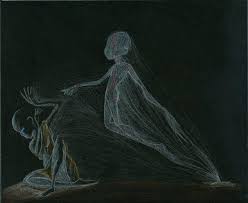
Essential Questions: Chapters 8-10
Seminar Discussion Chapters 8-10- Lesson 1:
Leading Questions: Everyone is to prepare responses to these questions. Bring your notes, observations, insights, and questions to class.
- To what extent is change necessary for people?
- How does Achebe use characters and situations to demonstrate change within the community?
Seminar Discussion Chapters 8-10- Lesson 1:
Leading Questions: Everyone is to prepare responses to these questions. Bring your notes, observations, insights, and questions to class.
- Think about language and translation. Why does Achebe include so many Igbo words? Why does he provide “translations” for some and integrate others? What does this say about his intended or assumed audience?
- What is the concept of ogbanje and how is it important to the novel?
- Fire and drumming are two important symbols in the novel. Find 3 examples of where it is discussed in the book and explain how they contribute to your understanding of the significance of fire / drumming in chapter 10.
- What is the point of view of the narrator? How does the point of view contribute to our understanding of the conflicting cultures? What techniques does the narrator use to evoke a participatory role for the reader?
Essential Questions: Chapters 11-13
- How is gender portrayed/represented in the text?
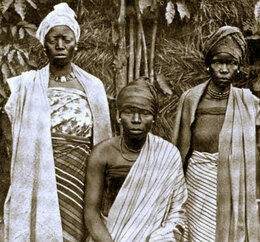
Seminar Discussion Chapters 11-13:
Leading Questions: Everyone is to prepare responses to these questions. Bring your notes, observations, insights, and questions to class.
- How does Okonkwo’s relationship with male and female characters differ? Why?
- What role do women play in this novel? What is life like for Okonkwo’s wives?
- Some female characters in the book don’t seem to fit the mold according to Okonkwo’s view? Who are they and why are they important to the text?
- When Okonkwo is sent into exile, he is sent to Mbanta, his “motherland,” where things seem very different than life in Umuofia. How are they different? What do these differences tell us about gender? What do you make of the expression “Mother is Supreme” that is mentioned in the book?
- What do the terms “patriarchy” and “matriarchy” mean? Give one example of each from the text.
- How is Okonkwo’s view of gender different from other characters’ view of gender roles in the novel? Give examples.
- Think about the character Ezinma. Of Ezinma, Okonkwo thinks: "She should have been a boy" (p. 64). Why is it necessary to the story that Okonkwo's most favored child be a girl? What does it mean that she has all of the characteristics that her father finds more valuable in a son?
- In the novel, there are two kinds of murder – male and female (124). What are these and what do they mean to the novel? Does it matter that Okonkwo committed the “female” kind of murder?
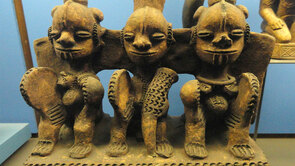
- Essential Questions:How does religion contribute to internal (native-native) and external (native-colonizer) conflict?
- What role does religion play in Things Fall Apart?
(To what extent could the role of religion be compared to the unseen societal expectations of male/female in ADH?)
Seminar Discussion Chapters 14-19:
Leading Questions: Everyone is to prepare responses to these questions. Bring your notes, observations, insights, and questions to class.
Leading Questions: Everyone is to prepare responses to these questions. Bring your notes, observations, insights, and questions to class.
- Discuss the religious significance of the W.B. Yeats poem, “The Second Coming” and what it means to the novel.
- What is “the center” of this novel? Why can it not hold? What forces are working in the book that prevent the “falconer” from hearing the “falcon”? What do these symbols translate to in the novel?
- How do the missionaries set the stage for colonial control? Who are the first converts, and why do these people find Christianity so appealing?
- What is Okonkwo’s view on the missionaries? On colonial education? How does his view differ from other characters’ views?
- Achebe wrote his novel in 1958, just before Nigeria’s independence. Why do you think he set the novel in the 1890s? What does this allow him to say about colonialism that he might not have said had his text been set in the present?
- Why does Okonkwo kill the court messenger?
- What are the consequences of Okonkwo’s murder?
Essential Question:
- What links can be made between A Doll's House and Things Fall Apart?
- How can a question be interpreted to suit the needs of both texts?
Task: Deconstruct the essay question and consider the themes that are present in each text. Create a Padlet (https://yis.padlet.org) or handwrite your ideas to be photographed and uploaded. Your aim is to be able to share your plans/ideas with the class.
- How could you approach answering the question for each text?
- Which examples and quotations would you use?
- What similarities and differences exist?
Questions:
- What role does POWER play in each text, and how could this link to the social, cultural or political context of the time?
- "CHANGE is inevitable." To what extent is this statement true in each text?
- What role does CONFLICT play in each text?
- RELATIONSHIPS are often a crucial factor in the conflict, tension or emotion in a text. How are RELATIONSHIPS depicted in the texts and what is revealed through them?
